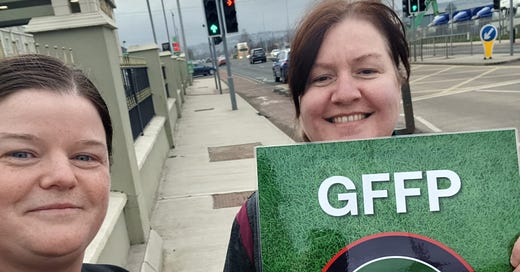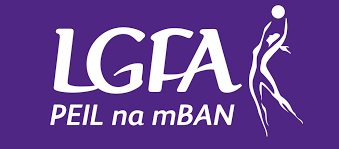Gaels for Fair Play: Petition
Mary-Anne McNulty, co-director, Gaels for Fair Play on the LGFA's short-sighted stance on males in women's Gaelic football
A Shocking Policy Change
One morning, in February, 2023, I was idly browsing through my phone when a story popped up on my news feed announcing that the Ladies Gaelic Football Association, of which I am a member, had introduced a new policy allowing trans-identifying males, from the age of 12 upwards, to participate in all levels of the sport.
Admission would depend on approval by a new 'Transgender Application Committee' but applicants who met the standard criteria would only be barred where 'unacceptable risk' arose.
I was unable to believe what I was seeing; they are letting males into the women's game? And this has been rolled out to children? I read on. Players under 16 would provide confirmation from a medical practitioner that they 'have transitioned or are transitioning from male to female' and intend to 'live their life as a female', while those over 16 would provide either confirmation from a medical practitioner or a gender recognition certificate—the GRC was not compulsory—and, additionally, provide medical records showing their testosterone levels in the previous 12 months were less or equal to 10 nanomoles per litre.
I clicked into several other news outlets carrying the story and noticed that the following line in the policy was being quoted near the top of nearly every single article: 'The association reiterates that it will not tolerate any harassment or discrimination within the LGFA'. The implication was clear: 'No debate allowed.'
Throughout that day, my phone pinged steadily with texts from friends and fellow LGFA members, all expressing shock and anger at this development. We knew the LGFA had been working on a transgender policy, spurred by an incident in August 2022. That month, Giulia Valentino, a trans-identifying male, played for Dublin’s Na Gaeil Aeracha (Rainbow Gaels) in a women’s match, which was paused when the referee questioned Valentino’s eligibility, citing his male status.
We had assumed the LGFA would follow in the footsteps of Irish Rugby, which had recently amended its transgender policy so that only those recorded female at birth would be eligible to play in the female category of contact rugby. We assumed wrong. A month after the policy was announced, Valentino’s application to the LGFA was approved.
As a referee, I was stunned that LGFA management hadn’t given me any prior notice of the policy or, afterward, any guidance on what match officials should do when a male player takes the field. I contacted my county’s referees’ coordinator, telling him I would no longer officiate matches while a policy compromising safety and fairness for women and girls remained in place. He said he’d relay my concerns to those in charge. I’m still awaiting a response.
Silenced Voices and Secret Votes
As it turns out, only a small inner circle of officials among the association’s 200,000 members knew about the policy before its ratification. It was approved by roughly eighty delegates representing members across Ireland at a Central Council meeting on February 15. We later learned that LGFA Chief Executive Helen O’Rourke had emailed the policy details to the executive committees of all county boards, with this directive: ‘The proposed policy and supporting documentation are not for circulation to clubs or members, as they must first be discussed and approved by Central Council.’
Our shock and disbelief grew. Delegates voting on a policy with huge implications for women and girls weren’t allowed to consult grassroots members. In short, the women and girls affected had no voice. Parents of teenage daughters—who might reasonably object to males playing a contact sport against their child or sharing a changing room while undressed—had no input. Coaches, volunteers, and club officials tasked with safeguarding players were silenced.
Since then, LGFA management has erected a brick wall between itself and its members. Efforts to engage with them have been ignored or met with wholly inadequate responses. A motion from one county board—to amend Rule 47 of the Official Guide to state, ‘All registered female-from-birth members… shall be eligible to play for a club, county, or province’—was blocked by management.
I followed the proper procedures outlined by management and emailed a list of policy-related questions to my club secretary for forwarding to the county board. I received this reply: ‘While the club supports your right to express your views, it’s not currently in a position to endorse them and thus won’t forward your correspondence to the county board.’
I spoke to players and members in other counties and heard similar tales of gatekeeping by club and county officials: requests to raise the issue at meetings were ignored, players were told ‘don’t rock the boat on this,’ and claims were made that the LGFA was legally required to adopt the policy, rendering objections futile.
Fighting Back with Gaels for Fair Play
Frustrated by the hierarchy’s refusal to engage, I co-founded Gaels for Fair Play with fellow LGFA member Danielle Loughrey. Within hours of launching on X, members across Ireland messaged us, saying they’d contacted the LGFA about their concerns but got no response. One member reported that LGFA President Micheal Naughton called her, insisting, ‘It was a legal obligation.’
In July last year, Gaels for Fair Play emailed Helen O’Rourke and other management committee members, outlining our policy concerns and requesting a meeting—our first contact with them. A week later, we received a ‘private and confidential’ letter from an LGFA solicitor. Following legal advice, we’re not disclosing its contents yet, but the choice to respond to a simple meeting request with a solicitor’s letter felt deeply intimidating. This isn’t acceptable from a supposedly democratic organization.
Safety, Fairness, and the Road Ahead
Last month, we launched a Change.org petition urging the LGFA to review its transgender policy and conduct a thorough consultation. Our petition lists the reasons for this demand: the policy was imposed without consent; it violates the association’s own code promising ‘safety and fairness for young girls and women’; it strays from best practices; it disregards medical and scientific evidence; it breaches equality laws protecting females’ right to single-sex sports; it undermines fairness, safety, privacy, and dignity for women and girls; the case-by-case approach, tried and later dropped by Irish Rugby for fairness and safety reasons, sets a precedent; and it poses serious safeguarding risks for adults and children.
As of now, the petition has 1,200 signatures. The top concern in the ‘reason for signing’ section is overwhelmingly safeguarding, especially for children. People are stunned that the LGFA extended this policy to kids, particularly since those under 16 can’t obtain a gender recognition certificate, and the Irish government recently scrapped plans to allow it. Many highlight the absurdity of letting teenage boys play against girls when, from age 12, girls are barred from playing Gaelic football or hurling with males for safety reasons.
It’s deeply troubling that girls as young as fifteen, allowed to play two grades above their age group and join senior women’s matches, can be coerced into accepting adult males on their fields and in their dressing rooms. Though the policy doesn’t address facility sharing, the LGFA has confirmed all facilities are open to playing members. Picture a girl going through puberty forced to undress near a male, struggling to suppress her instincts and convince herself he’s not a male standing two feet away as she removes her top. Imagine her distress, knowing she can’t object or say, ‘I don’t consent,’ without repercussions. I don’t think it’s an overstatement to call this psychological warfare by the LGFA against its own members.
The petition has gained encouraging support, as has a recent motion by Aontú’s Emer Tóibín at Meath County Council, urging the LGFA to reverse its transgender policy for the sake of fairness and safety. Though the motion failed, nine councillors showed integrity by voting in favor, including—surprisingly—representatives from Sinn Féin and Fine Gael, parties that have recently championed gender ideology..
One of the biggest barriers to reversing this policy is a group of LGFA officials with outsized influence in the association. We suspect they’ve bought into the LGFA hierarchy’s narrative that the policy was legally required and that the case-by-case approach carefully manages male inclusion without impacting women and girls..
Thus far, we’ve struggled to convince them that the only way to prevent harm is to exclude all males, rather than waiting for an incident and reacting afterward. A case-by-case approach works—until it doesn’t.
Then there’s the common claim, ‘Sure, it’s only a few being admitted.’ Those who say this unwittingly expose their doubts about the policy: by implying there’s a tipping point where it becomes an issue, they admit it’s inherently unfair.
What’s frustrating is that this could be resolved sensibly and compassionately if the LGFA admitted that including trans-identifying males in ladies’ Gaelic football can’t be reconciled with safety and fairness. This wouldn’t bar anyone from playing—men and boys have the GAA, which governs Gaelic football and hurling. We embrace its motto, ‘Where We All Belong,’ but simply ask that everyone plays in their correct sex category.
It’s worth noting that the GAA, LGFA, and Camogie aim to merge into one association by 2027. The steering group for this integration unanimously agreed the new structure ‘will be built on equality.’ Yet, if this policy persists, equality for women and girls is a sham—male inclusion is being prioritized over their right to fair and safe sport.
Mobilizing the grassroots has been tough. Many hesitate to speak out, fearing they’ll be branded transphobic or lose opportunities within the LGFA. Others won’t act until the issue hits their own club. But we can’t wait—too much is at stake. We’re dedicated players, coaches, referees, volunteers, and parents who love this association and its members. It’s heartbreaking and infuriating to watch our leaders betray the women and girls they’re meant to champion and protect.
And so, we fight on.
To sign their petition, please follow this link
Genspect publishes a variety of authors with different perspectives. Any opinions expressed in this article are the author’s and do not necessarily reflect Genspect’s official position. For more on Genspect, visit our FAQs.






